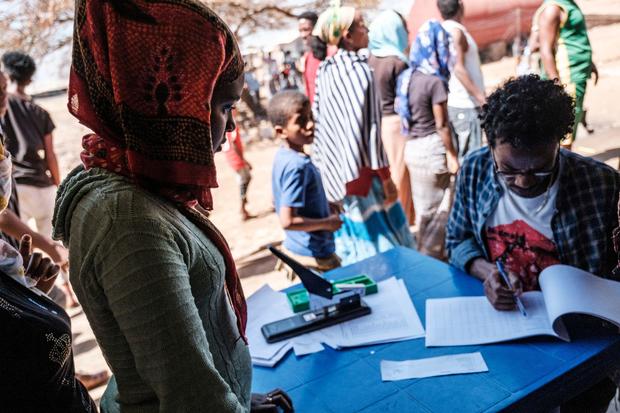President Biden issued an executive order on Thursday to increase refugee admissions and allow the U.S. to set a goal of providing safe haven to 125,000 people around the world fleeing violence, conflict, and persecution during his first full fiscal year in office.
In the order, Mr. Biden called for an expansion of the decades-old U.S. refugee program, which was gutted by former President Trump, who frequently portrayed refugees as economic and security risks. After former President Obama set a 110,000-person ceiling before leaving office, Mr. Trump slashed it every fiscal year, allocating a historically low 15,000 spots in 2020.
During a speech at the State Department earlier Thursday, Mr. Biden said the objective is to set a 125,000-person cap for fiscal year 2022, which starts in October. Mr. Biden also said he directed the State Department to consult with Congress “about making a down payment on that commitment as soon as possible,” hinting that he may move to raise the 15,000 cap for the current fiscal year.
“It’s going to take time to rebuild what has been so badly damaged, but that’s precisely what we’re going to do,” Mr. Biden said during his remarks, noting that refugee resettlement has historically enjoyed bipartisan support.
Last week, the United Nations refugee agency reported that countries around the globe received fewer than 23,000 refugees in 2020, the lowest number in nearly two decades, in part due to travel restrictions during the coronavirus pandemic. The agency said that out of the more than 20 million refugees it is assisting in different countries, 1.44 million are in urgent need of resettlement.
The U.S. admitted less than 12,000 refugees in fiscal year 2020 and received nearly 1,000 between October and December, according to the latest State Department data.
The modern U.S. refugee program, established in 1980, is designed to offer protection to people abroad who have faced persecution based on their race, religion, nationality, political opinion or membership in a social group, like the LGBT community.

Earlier in the week, Democratic Representatives Jerrold Nadler and Zoe Lofgren urged Mr. Biden to craft refugee policy that takes into account migration fueled by climate change, particularly from Central America, a region ravaged by two hurricanes last fall. The World Bank estimated that 1.4 million people in Mexico and Central America could migrate by 2050 because of the effects of climate change, including crop failures.
“We are greatly encouraged to see that the Biden administration is aligned with our recommendations and that they are beginning the process of rebuilding this historically bipartisan program and returning the United States to its leadership position on the world stage,” Nadler and Lofgren wrote in their letter.
Soon after taking office in 2017, Mr. Trump moved to temporarily suspend the refugee program, arguing that more vetting procedures needed to be implemented. In addition to dramatically cutting admissions, Mr. Trump also issued an order allowing states and local jurisdictions to block the resettlement of refugees in their communities.
Through his order on Thursday, Mr. Biden revoked Mr. Trump’s directives.
Mr. Biden ordered the Department of Homeland Security to consider allowing refugees to be interviewed remotely and required the Office of Personnel Management to support the hiring of more refugee officers. The president also called for an expansion of private and community sponsorship of refugees, a partnership the Canadian government has relied on.
Mr. Trump’s changes prompted the nonprofit groups that help the government resettle refugees to close offices, layoff personnel, and lose federal funds.
Matthew Soerens, the director of church mobilization at World Relief, one of those resettlement agencies, said his group closed eight offices during the Trump administration. He said resettling 125,000 refugees during the remainder of fiscal year 2021 would likely be impossible, given the current infrastructure.
“We’re really eager to rebuild and excited for the opportunity,” Soerens told CBS News. “But we’re also doing this as quickly as we can with limited resources. It’s not going to be something that’s going to be rebuilt overnight.”
Resettlement agencies receive refugees when they arrive to the U.S. and help them with housing, finding employment, enrolling their children in schools, and other matters to facilitate their integration into American communities.
Meredith Owen, the director of policy and advocacy at Church World Service, another resettlement agency, echoed Soerens’ comments.
“We’re going to need the Biden administration to really take concrete steps to rebuild the overseas and the domestic infrastructure to actually be able to resettle the number of refugees that we’re hoping to over the next four years,” Owen told CBS News, saying the processing of refugees should also be expedited.
The Lutheran Immigration and Refugee Service closed or suspended services at 17 of its 48 resettlement offices during the past four years. While acknowledging the logistical challenges of ramping up refugee admissions, Krish Vignarajah, the group’s president, highlighted the symbolism of Mr. Biden’s commitment.
“Raising the ceiling will literally be life-saving for hundreds of thousands fleeing violence and persecution because of the color of their skin, how they worship or who they love,” Vignarajah told CBS News.










